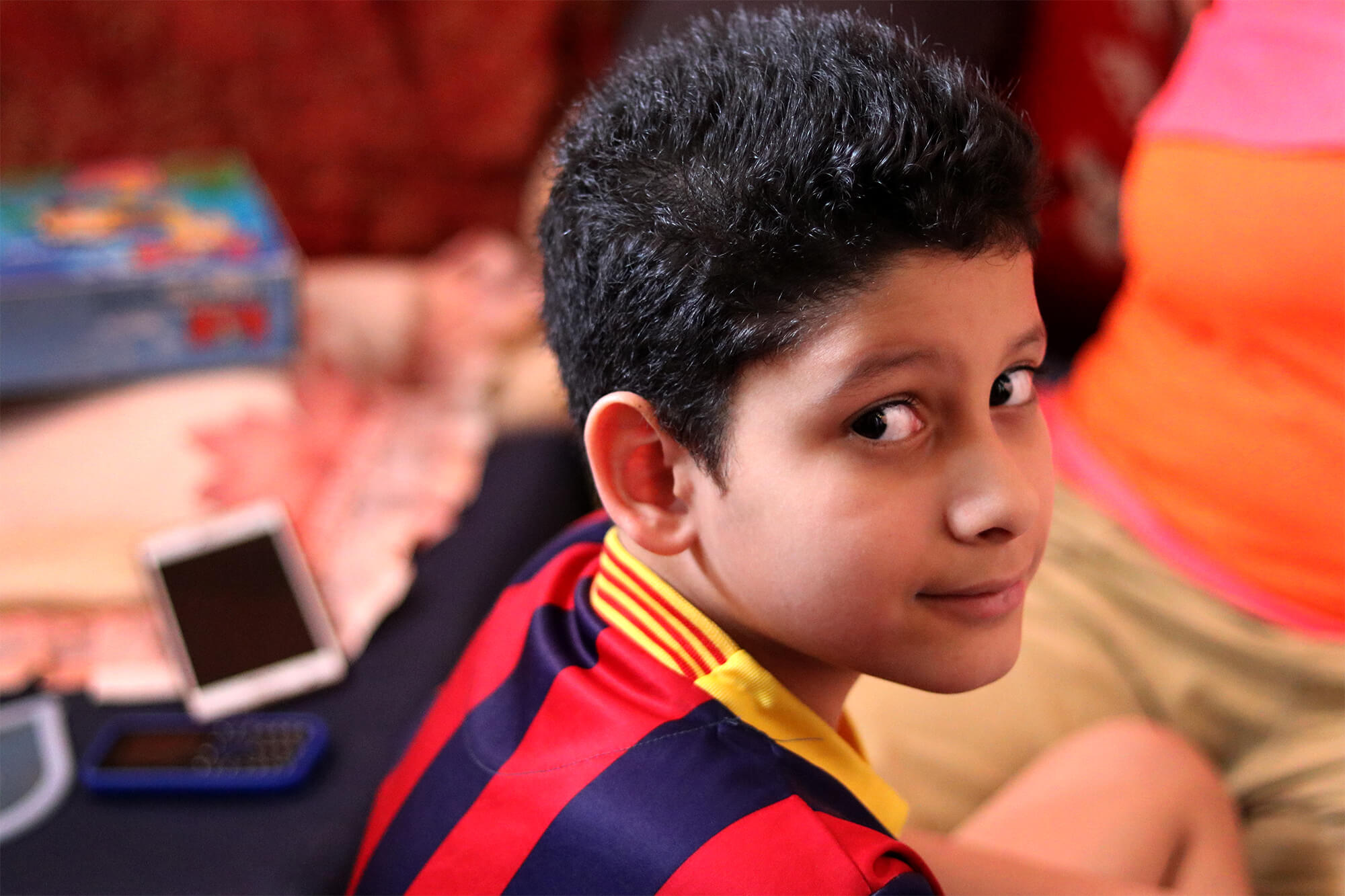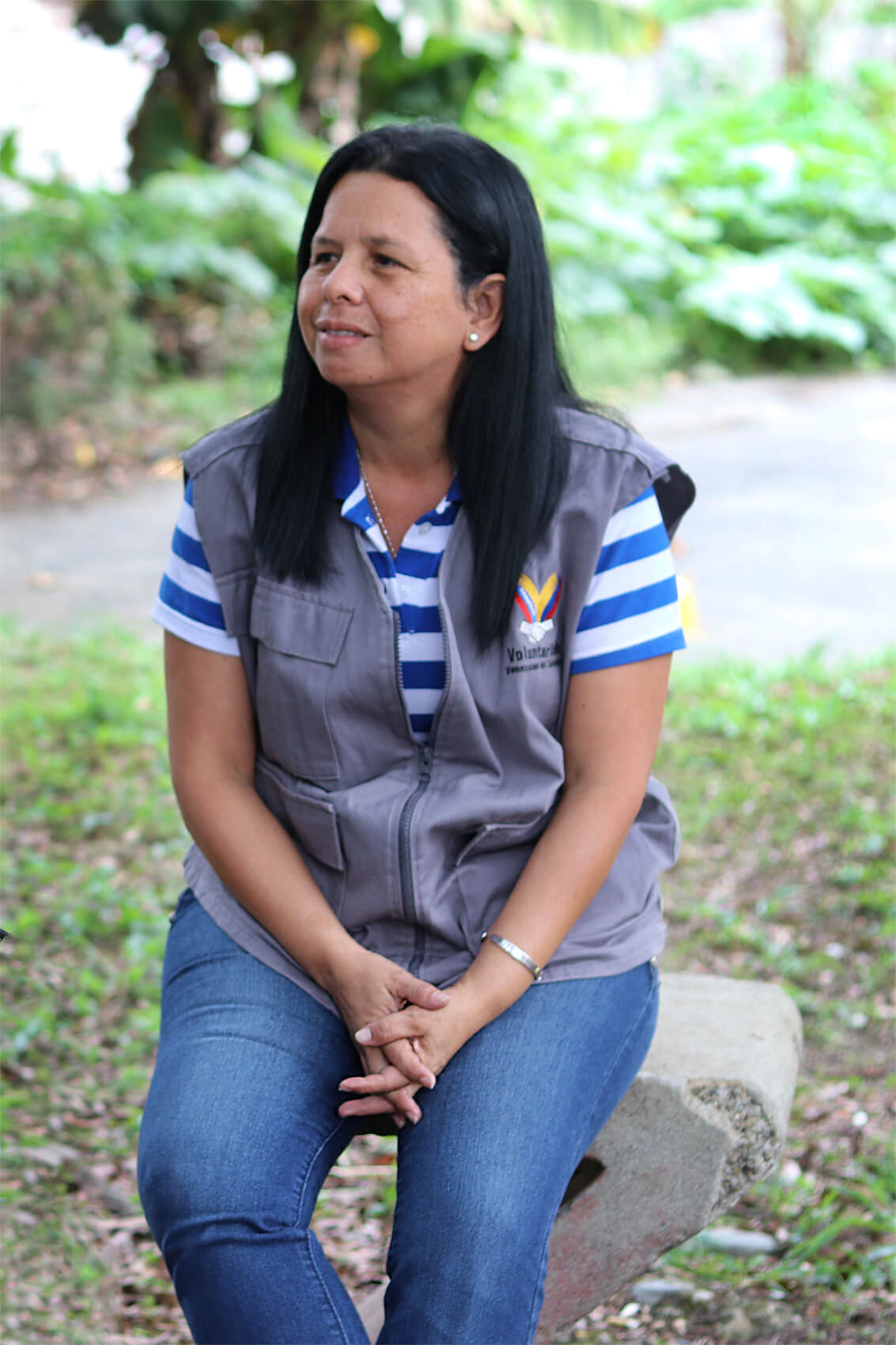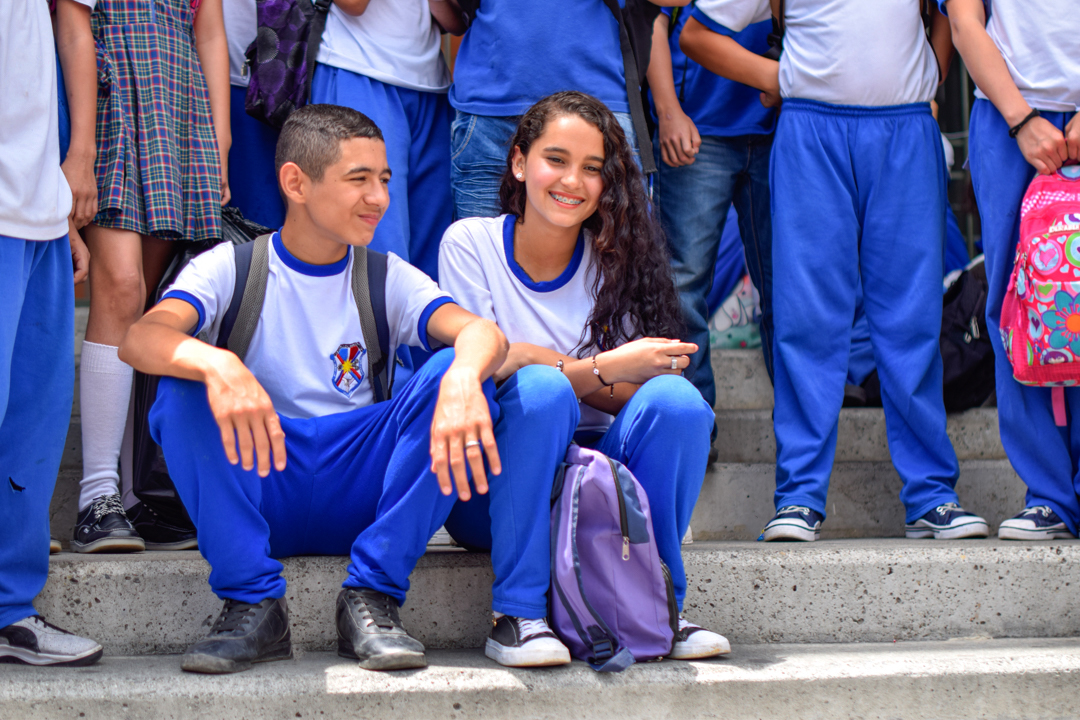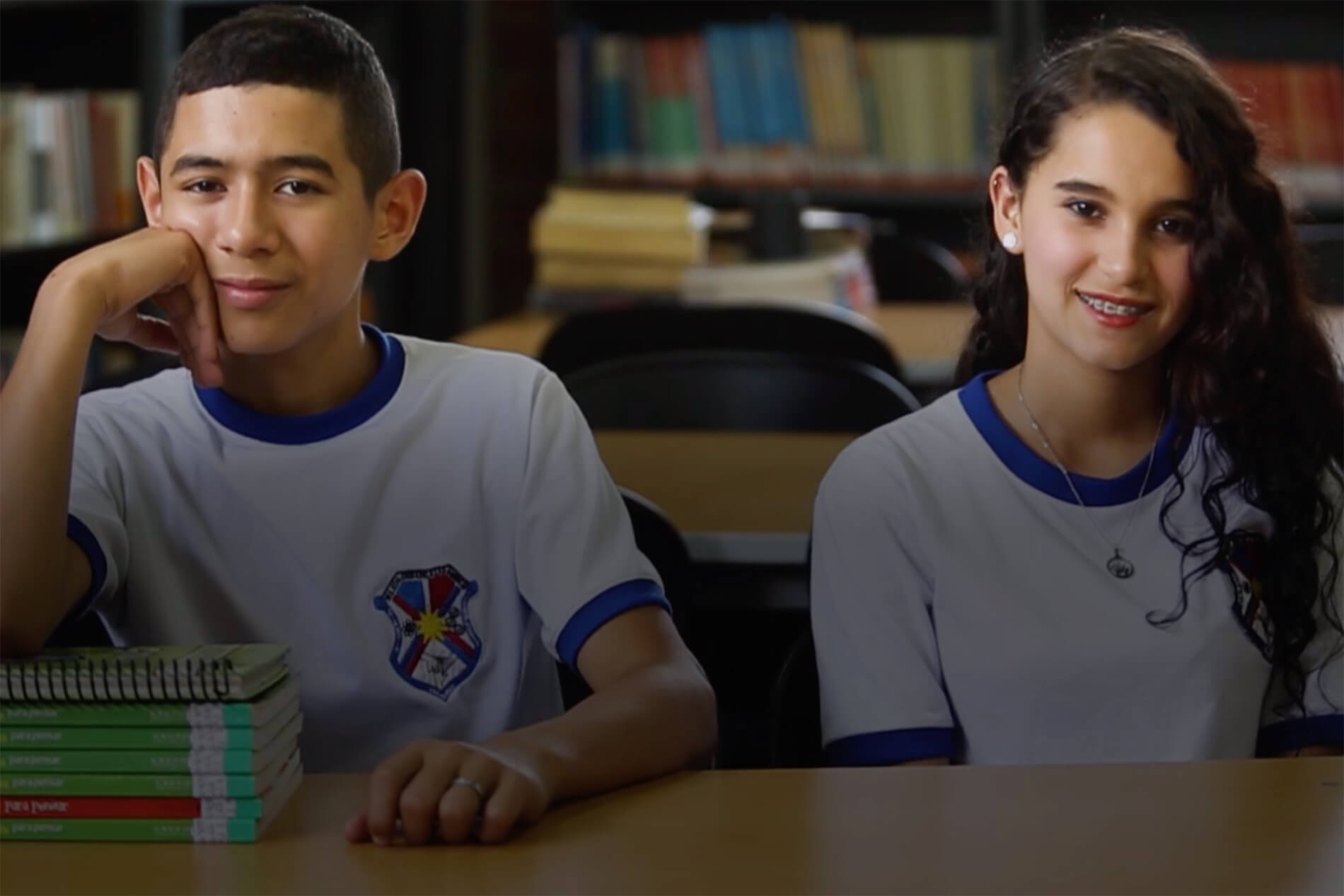It took four arepas to fill 6-year-old Jeham Carlos’ stomach. But he decided to get by on just two because his parents struggled to keep enough food in their house back home in Venezuela.
He never told his parents he was still hungry. He didn’t want them to worry. They had enough worries already. Three years later, his mother, Alejandrina, cries as she hears her son talk about this tender sacrifice for the first time.
Jeham, a thin, slight boy, has more food in Medellín, but it comes at a price. Alejandrina, who has dark black curls and hazel eyes, started selling coffee in Parque Berrio after the family first arrived in October 2018, but it wasn’t enough to support them. Jeham would sit on a dark green bench next to her, watching his mom struggle. He asked if he could sell candy or “confetti” – he couldn’t stand to see how hard his mom worked and not do anything to help her.
Now, instead of going to school, he sells heart-shaped red lollipops in a park with trees and sculptures – the kind of park where families might picnic. But locally, it’s associated with drugs, gangs and prostitution. The gang activity scares him, but he can’t think of another way to help his mother.
Alejandrina says she was apprehensive at first about Jeham working.
“It was hard in the beginning. As a mother, I felt bad,” she said. “I used to say ‘God, he is just a kid and doesn’t deserve this type of life.’”
Now, Alejandrina says she feels proud of Jeham’s strength.
The Medellín education system says every migrant child who seeks education is given the opportunity, but many Venezuelan youths like Jeham are not attending school, or are at risk of dropping out due to the lack of resources. Others do not enroll in school because they fear deportation or not having enough funds for school supplies, daily food and transportation costs. According to the International Rescue Committee, roughly 50 percent of Venezuelan children in Colombia are not enrolled in school.

OPEN ARMS

In comparison, 8% of all students in schools along the Colombian border are Venezuelan. The education system needs 8,000 additional seats to fit the migrant demand.







All students are required to wear uniforms in public and private schools. Uniforms consist of two sets: one for everyday use and another for physical education. Each school uniform costs around 42,000 pesos ($16.80 USD).
Each book is around 32,000 pesos ($12.80 USD), and a backpack is 17,000 pesos ($6.80 USD).








At age 9, Jeham is the household’s only source of income. On a good day, he brings in COP $40,000, about USD $10. Two dollars goes toward rent — the rest is spent on food, electricity, water and savings for medication.
Jeham has managed to save COP $40,000 in the last month. He used it to buy a Game Boy, his only source of distraction and fun.
“I bought a toy for my cousin back home,” Jeham said. “I could never afford toys in Venezuela.”

Jeham Carlos, age 9, has missed months of school. Instead, he sells candy on the street to help pay rent at the one-bedroom apartment he shares with his mother, his grandmother and a family friend.
They share a one-bedroom rental in Medellín with Alejandrina’s mother and a family friend.
It’s a small, bare house with red brick walls, some of which have peeling paint with cracks. The kitchen consists of a white plastic sink, a single electric burner, a mini fridge and four plates – just enough for the four people that live there.
It has one bed where Jeham and Alejandrina sleep. It’s the size of a twin college dorm bed, feels thinner than a pillow and as hard as granite. Jeham’s grandmother and the family’s friend sleep on the rigid red and white tile floor.
The move is supposed to be temporary. Alejandrina plans to make enough money to buy supplies for the birth of her second child, due in June, and return home. Due to shortages and soaring inflation, pregnant women are expected to purchase the medication and any other materials their doctors might need. Alejandrina’s close friend died shortly after giving birth because the doctors did not have antibiotics to provide to her.
Alejandrina is on maternity leave from her job as a public school teacher. She did not want to use her last name because if the government found out she left Venezuela, she would be fired. She and her family left without telling anyone and did not get their passports stamped at the border or file for work permits, so they’re not on record for crossing. But she’s adamant that her child be born in Venezuela, so the child can have citizenship.
“There is no birth citizen right in Colombia,” Alejandrina said. “So giving birth here was not a possibility.”
As Venezuelans tried to overcome the economic and political crisis, Jeham’s family wrestled to get through. Eventually, Jeham’s parents split.
“Maybe because we didn’t know how to handle it,” Alejandrina said.
Before the separation, Jeham attended a private school in Venezuela, where Alejandrina was the principal. But as food, medication and money became scarce, Alejandrina was forced to find a second job as a teacher in a public school. Her family is known to be strong supporters of the opposition so, for her to get the job, she had to move to a new town and pledge loyalty to Hugo Chávez.
In 2006 the education system changed in Venezuela, and the government used teachers to spread propaganda.
Lisbeth Marcan was a public school teacher in Venezuela for 25 years before immigrating to Medellín in May 2018. She says the government removed some of the most critical materials. Instead of focusing on teaching Spanish, she was forced to teach her students about “socialist heroes” in Venezuela like Ezequiel Zamora.

Lisbeth Marcan was a teacher in Venezuela for 25 years. In Colombia, she hasn’t been able to re-validate her degree, so she works as a domestic cleaner and volunteers to help other Venezuelans.
The standards for holding children back in school also changed. Under the new system, teachers must first get parental consent and then the permission of the government.
“As a result, every student passes,” says Marcan.
Spending so much time with each other, the kids noticed the disparity between each other, even as they were being taught the tenets of socialism. The kids would constantly ask Marcan why they weren’t equal to everyone if they lived in a socialist society.
“He brought two colors to class; I’m going to take one away from him because we are equal and so he has to have one, and I have to have one,” her kids would say.
Alejandrina has experience in the public and private education systems. She said children in both systems suffer from the crisis. The children she oversaw in private school had everything in regards to food, school supplies and shoes but were affected psychologically.
“A lot of them cry in the classrooms. They miss their parents who left to give the kids the life they have.”
But the children she teaches in public school were even more affected.
“When we came back from summer, the kids were skinnier and unrecognizable,” Alejandrina said.
They had no school supplies, shoes or food. As a teacher, she had to excuse students as young as fourth graders who arrived late because they were taking care of their younger siblings.
Jeham saw the disparities among his classmates, too.
“I felt awful. Sometimes they brought a banana, and that was what they ate the whole day,” Jeham said.
According to an investigation by The New York Times, 21 doctors across Venezuela said children with severe malnutrition are swamping their emergency rooms, a condition rarely seen before the crisis.
Marcan says children are the most affected during the crisis.
“It’s hard to see a child faint during the national anthem because he has not eaten.”
Most children would save their only meal for dinner or have the water that was left over from cooking with salt for breakfast and lunch.
“They have a strong level of malnutrition, that their growth and cognitive development is not the same,” Marcan said. “Instead of thinking about math, they’re thinking about food.”
She says that although President Nicolás Maduro created a program called Programa de Alimentación Escolar (School Nutrition Program), it’s not enough. The food arrives every eight days, and most of the fruit is damaged. Marcan says the food was just enough for 200 children at her school of 1,000 students. The school was forced to prioritize the students who spent the most time there and what was left over was for the youngest students.
Although teachers like Marcan and Alejandrina wanted to help their students, their paychecks weren’t enough. Every two weeks, teachers receive $18,000 Bolívares, barely enough for half a kilogram of cheese.
Today, Marcan cleans houses because she wasn’t able to transfer her teaching degree from Venezuela to Colombia. In her free time, she helps Venezuelan children immigrating to Medellín who are not adapting to their new schools.
“Their lives are completely changed,” Marcan said. “When a Venezuelan child approaches you … he’s been asking you for help.”
The Ministry of Education in Medellín says Mayor Federico Gutiérrez promised access to education to every migrant child. Today, there are more than 8,900 Venezuelan children enrolled in the Medellín Education System. Although many Colombians think Venezuelan children are taking away the education of Colombian kids, the Ministry of Education says it’s not true.
“I want to clarify that none of the Venezuelan kids are taking away the spots of the Colombian kids,” said Julian Henao Zapata, a coordinator. “Currently, Medellín has a capacity of 333,000 children, and only 308,000 are enrolled.”
The Ministry of Education believes school is the best strategy of security to keep children away from drugs, gangs and other problems that can occur to vulnerable children.
“The education right is a fundamental right that is not bound to any migratory status,” says Viviana Palacio Revello of communications. “The Medellín Education System has been opened to the Venezuelan immigrant kids despite the immigration status they have.”
That hasn’t always been the case. Lack of paperwork is a big barrier for migrant children.
Anyelis Juarez Duran, 15, and her brother Angelos Juarez Duran, 13, have been in Medellín for approximately two years and missed a year of school when they first arrived. Instead of going to school, the pair sold food in the street but saw no profit. The frustration of not attending school was getting high, especially for Anyelis who just celebrated her quinceañera, a Latin tradition that symbolizes the transition to adulthood. Anyelis has been acting as the adult in her family while her mother is working.

Angelos, left, and Anyelis Juarez Duran missed a year of school when they first arrived in Medellín. According to the Medellín Ministry of Education, all Venezuelan children are allowed to enroll in public school, even if they are undocumented.
“I wanted to study, and many times I’d go and find out things while my mom was working,” Anyelis said. “The principal sent me to the educative nucleus were I was given a validation package to complete.”
The siblings say their peers have helped them adapt to the education system. However, getting there was not as easy. Education has always been a passion for Anyelis, and she took it upon herself to make it happen.
One day, Anyelis woke up decided to enroll in school. She got dressed and walked to the nearest school to explain her situation to the current principal. Her brother, Angelos, says he feels lucky to have Anyelis.
“Anyelis was the one that moved around to get us the spot for the school,” Angelos said. “She did a lot of stuff so we could study and if it weren’t for her, we wouldn’t be studying at this moment.”
The Ministry of Education says it will work with migrant children who do not have any paperwork or resources.
“They believe we will ask them for their papers, or they will be advised to go to migration services to solve their issues and make them go back,” Zapata said. “But it’s not like that.”
Angelos’ transition to school has not been smooth, and he says the classes are harder. Many students feel pressured because they arrive in Colombia having to catch up.
“The children arrive with a low academic level,” Marcan said. “Many times children have to be lowered two years.”
Things as simple as school books can have a significant effect on children. In Venezuela, children have three school books, but when they arrive in Medellín, they have nine.
“Then that rhythm of life hits them because it changes their life completely,” Marcan said.
The differences between the same language can affect the relationship between teachers and students.
“It shocks them, and they think the teacher is being rude or can’t understand them,” Marcan said.
The Medellín education system says it offers tutoring programs to every kid, including migrant children.
“When students are registered in the Medellín education system they automatically have the same rights as all the other kids,” Zapata said. Although many Venezuelans are not aware of the programs available to them, they can get transportation discounts, supplies, uniform donations and tutoring.
Despite the help accessible to migrants, children like Anyelis and Angelos are still at risk of losing access to their education because of their lack of resources. Their mother lost her job, and the deadline to pay rent is coming up.
“It’s a shame because she always feels ashamed and feels like crying because she brought us here for something better,” Anyelis said.
The family has been trying to find a solution, even if that means being separated. Angelos and his little brother would leave with their mom to a farm where they could work. But they would have to leave Anyelis behind to study.
At the farm, the quality of education is low. Students only have to attend three times a week and do most of the learning on their own. Anyelis wants to keep fighting for her dream of being a veterinarian, but the future of her education and living situation is uncertain.
